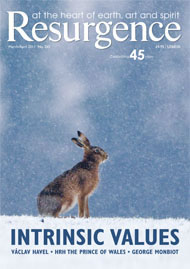The contribution of theology to economic decision-making is not only about raising questions concerning the common good; questions to do with how this or that policy grants or withholds liberty for the most disadvantaged. These are obviously necessary matters, and a sound theological stress on mutuality, on the balance of dependence and gift is crucial to our public discussion of economics. But we need also to look with the greatest of care at what is being assumed and what is being actively promoted by our economic practices about human motivation, about character and integrity.
This impacts ...
There are approximately 1030 more words in this article.
To read the rest of this article, please buy this issue, or join the Resurgence Trust. As a member you will receive access to the complete archive of magazines from May 1966.
If you are already a member, please Sign in







